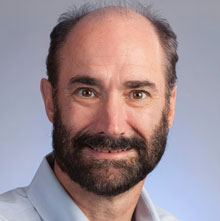Covering your BASES: California Seminar Series
The monthly Bay Area Strategic Engagement Seminars (BASES) series in California has been, by all accounts, a home run. The series gives staff a chance to learn from leaders in key Sandia-related fields, and most recently brought Stanford University Genetics Chair Michael Snyder to campus.
Snyder shared his vision for the future of medicine, in which big data sets from DNA sequencing, wearable electronic devices, bodily fluid analysis and other sources will help predict, diagnose and treat disease before symptoms ever appear.
“The way we’re doing medicine now is all wrong,” Snyder said. “We treat people when they’re sick. We need to follow them when they’re healthy.”
In his clinic, Snyder has been following more than 100 healthy people, measuring them every three months or more for the past four years. Regular profiling with new technologies has

allowed him to discover early cancers in some patients and notably, diabetes and Lyme disease in himself.
New technologies for personal health profiling
The concept of obtaining baseline data about a patient to assess their health isn’t new of course. It is normal for doctors to assess weight, blood pressure and such against previous measurements. What is new is the incredible depth to which people can now be sampled using new technologies.
Sequencing all 6 billion base pairs of DNA in a person’s genome costs now costs less than $1,000, and is key to learning about conditions to which an individual may be predisposed. Snyder tracks DNA for his patients, as well as multiple other ‘omes’ – including their epigenome (how the genome is read and acted upon), proteome (proteins), transcriptome (all RNA molecules) and microbiome (microbes found in the gut, skin, nose, mouth and urine).
Add to this picture the massive amounts of health data that Snyder is able to pull from wearable electronics. Snyder uses eight different devices to continuously track everything from weight, skin temperature, exercise and sleeping patterns to heart rate, blood oxygen levels and radiation exposure. Snyder says even the most basic smart watch alone can collect up to 250,000 measurements per day.
“The way we’re doing medicine now is all wrong. We treat people when they’re sick. We need to follow them when they’re healthy.”
Michael Snyder
Completing the picture are advances in mass spectrometry that allow the analysis of blood and urine to an extent not possible a decade ago. Taken together, the data enables medicine that not only can predict illness, but also personalize treatments.
Systems analyst Andrew Kosydar is excited by what he heard. “Professor Snyder’s work at the fascinating intersection of health and big data represents the future of medicine. These advancements will change the approach to medicine in this country from being primarily reactive to proactive,” he said.
Computational scientist Kunal Poorey was similarly energized. Kunal’s work has explored the use of data science on multi-omics data sets for early detection, as well as the correlation of diseases and the microbiome. “The most effective medical interventions vary from person to person. This is the future of medicine, and definitely a topic I want to work on in the near future,” Kunal said.
Next at bat for BASES
The BASES series was originally the brainchild of Sheryl Hingorani, Jason Reinhardt, and Michael Nacht. Its goal is bringing thought leaders from institutions around the Bay Area to the California site to engage on national security topics and inject their thinking back into Sandia by establishing long-term relationships.
Since the inaugural March 2016 session in which the University of California, Berkeley’s Sol Hsiang spoke on climatological threats to peace and prosperity, talks have covered topics ranging from the search for life on other planets to analysis of North Korea’s nuclear capabilities. Video of the talks is always available for viewing on Sandia’s BASES website.
Coming up next for BASES on June 26, professor Daniel Sperling of the University of California, Davis, will offer a seminar on sustainable transportation, “Three revolutions: automation, electric vehicles and ride sharing.” He’ll explore the opportunities and the risks of these disruptive innovations, and what they will likely mean for public policy, mass transit and the automotive industry.
In 2013, Sperling received the Blue Planet Prize from the Asahi Glass Foundation, which has been described as the Nobel Prize for environmental sciences. Those interested in meeting him before or after his seminar, contact Andrew Kosydar 925-667-1057 or Anthony Juarez 925-294-6210.